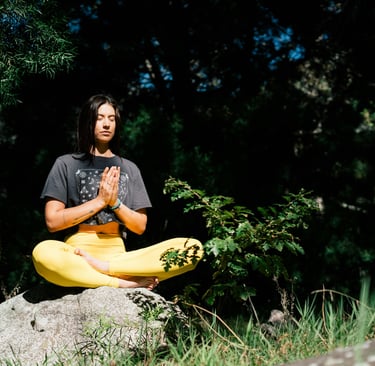Awaken Your Inner Self: A Step-by-Step Guide to Starting Your Spiritual Journey


What is a Spiritual Journey?
A spiritual journey is the process of exploring your beliefs, values, and connection to the universe. It’s about self-awareness, growth, and aligning with your true purpose. Whether you’re seeking inner peace, healing, or a greater understanding of life, a spiritual journey is your personal path to transformation.
10 Steps to Start Your Spiritual Journey
1. Clarify Your Intentions
Start by understanding why you want to embark on this path. Are you seeking clarity, healing, or a deeper connection to yourself? Defining your intentions will give you a clear direction.
Tips for Reflection:
Journal your thoughts and goals.
Ask yourself: What am I seeking on this journey?
Be honest about your motivations, even if they’re uncertain at first.
2. Be Open to New Experiences
Spirituality isn’t confined to one belief system or practice. Stay curious and explore different paths to find what resonates with you.
Ways to Explore:
Read books or listen to podcasts on spirituality, mindfulness, or self-development.
Try practices like meditation, yoga, or breathwork.
Learn about various spiritual traditions and philosophies.
3. Practice Mindfulness Daily
Mindfulness is the cornerstone of any spiritual journey. It helps you stay present, reduce stress, and connect with your inner self.
How to Get Started:
Meditate for 5–10 minutes each day.
Focus on your breath and let go of distractions.
Practice gratitude by listing three things you’re thankful for daily.
4. Connect with Nature
Nature has a calming, grounding effect that can enhance your spiritual journey. It helps you feel connected to the universe and brings clarity to your thoughts.
Ideas to Connect with Nature:
Go for a walk in a park or forest.
Spend time observing the stars, sunrise, or sunset.
Practice grounding by walking barefoot on grass or sand.
5. Create a Sacred Space
Having a dedicated space for reflection or meditation can help anchor your spiritual practices.
How to Create Your Space:
Choose a quiet corner in your home.
Add calming elements like candles, crystals, or plants.
Use this space for meditation, journaling, or deep breathing.
6. Journal Your Journey
Journaling is a powerful tool for self-reflection and tracking your growth. It allows you to process emotions, identify patterns, and set intentions.
Journaling Prompts:
What am I grateful for today?
What challenges am I facing, and how can I grow from them?
What insights have I gained about myself recently?
7. Seek Guidance and Community
While your spiritual journey is personal, connecting with others can provide valuable support and inspiration.
How to Find Support:
Join online or local spiritual groups.
Attend workshops or retreats focused on mindfulness or personal growth.
Seek guidance from a mentor or spiritual teacher.
8. Let Go of Expectations
Your spiritual journey is unique, and it won’t always follow a clear path. Let go of the need for immediate answers or perfection and trust the process.
Mindset Shifts:
Focus on the journey, not the destination.
Be patient with yourself during moments of uncertainty.
Celebrate small breakthroughs along the way.
9. Develop Rituals That Resonate with You
Rituals help you stay consistent and intentional in your spiritual practice. They can be simple yet deeply meaningful.
Examples of Rituals:
Lighting a candle during meditation or prayer.
Writing affirmations or setting daily intentions.
Practicing gratitude at the start or end of your day.
10. Integrate Spirituality Into Everyday Life
True spirituality isn’t just about rituals or practices—it’s a way of being. Strive to live with mindfulness, kindness, and authenticity in your daily interactions.
Tips for Integration:
Stay present in your daily activities, whether working or relaxing.
Let your values guide your decisions.
Practice compassion toward yourself and others.
Why Starting Your Spiritual Journey Matters
Your spiritual journey is a path of self-discovery, growth, and peace. It helps you connect with your inner self, align with your values, and navigate life with clarity and purpose. By following these steps, you can create a spiritual practice that feels authentic and sustainable for you.
FAQs About Starting a Spiritual Journey
1. Do I need to follow a specific religion to be spiritual?
No, spirituality is personal and doesn’t require adherence to a specific religion. It’s about finding what resonates with you, whether that involves religion, mindfulness, or personal beliefs.
2. How long does a spiritual journey take?
There’s no set timeline—it’s a lifelong process of growth and discovery. Focus on enjoying the journey rather than reaching a destination.
3. Can I start my spiritual journey at any age?
Absolutely! Spirituality is for everyone, regardless of age or life stage. It’s never too late to begin exploring your inner self.
Final Thoughts
Starting your spiritual journey is a courageous step toward self-awareness, peace, and purpose. By embracing mindfulness, connecting with nature, and exploring practices that resonate with you, you’ll create a path that’s deeply fulfilling and uniquely yours.
Are you ready to take the first step? Begin today and discover the power of living a more mindful, intentional life.
